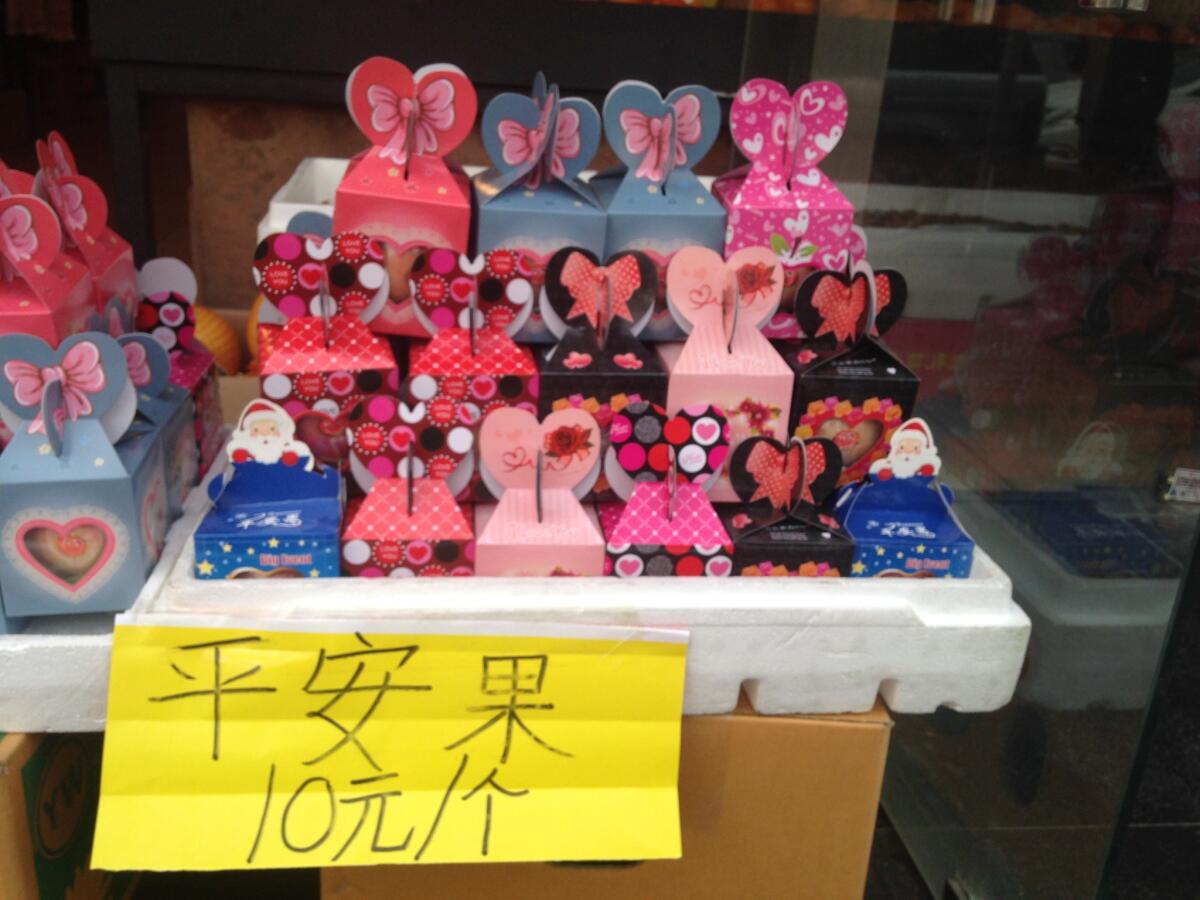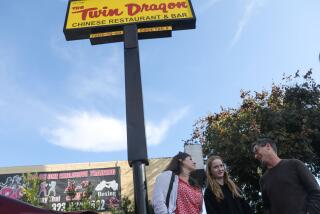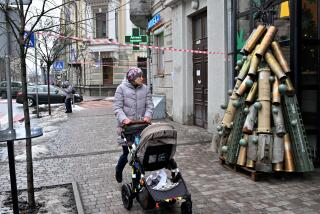In China, nothing says Merry Christmas like ... an apple?

BEIJING -- Christmas may not be an official day off in China -- banks, offices and schools are open as normal. But with the holiday becoming a bigger and bigger event here, millions were finding ways -- some a bit offbeat, others downright traditional -- to share in the seasonal spirit.
It’s nigh impossible to go into a Beijing mall this time of year without hearing “Jingle Bells” or “Deck the Halls” playing; at the U-Town shopping center, even clerks at the Chinese sausage stand donned Santa hats. Management at the Chaoyang Joy City arranged for live penguins to go on display in a refrigerated box for four days and a number of Santas could be found lending their laps to local children.
This year, some venues were opting for Chinese Kris Kringles rather than shelling out for foreign Father Christmases as in past years. Some news outlets described this as a cost-cutting move, with business owners fearing the government’s recent austerity campaign against officials’ extravagant gift-giving and banqueting would reduce Christmas spending and therefore their profits.
PHOTOS: Christmas around the world
(At least one jewelry company, though, bucked the trend, sponsoring an “authentic Santa Claus from Finland” to visit the city of Jinan. The Scandinavian country has been mounting efforts to promote Santa’s Finnish heritage to Chinese consumers, recently allocating some $400,000 to a publicity and tourism campaign.)
The state-run China Daily reported that upscale hotels in Nanjing, Guangzhou and other cities had slashed prices for Christmas buffets to about $140, down from $300 or higher in 2012.
Those with more modest Christmas gift-giving budgets could opt for a distinctively Chinese way to mark the holiday -- giving “peace apples” on Christmas Eve.
Peace apples are regular, individual apples packaged in a special box or wrapped in colored paper; some have messages like “Merry Christmas” stenciled on them. At about $1.50, they’re more than twice as expensive as a regular apple but well within the reach of regular consumers. Young men in particular find them an appealing gift for girlfriends; some of the boxes are decorated with hearts and lips, rather than Santas and Christmas trees.
The tradition, which dates back at least five years, seems to stem from the fact that the Chinese word for apple, pingguo, sounds similar to the word for Christmas Eve, pinganye.
On Tuesday, 35-year-old Liu Xingwen was buying a peace apple for her 5-year-old son, Li, near the Yonghegong subway station. He had already received his major Christmas gift, a giant Lego set, on Monday.
“He’s got school on Christmas Day, so we gave him his big gift early,” she said. The peace apple, she said, was just a little bonus.
For many young, urban Chinese, Christmas is a “festival” to be spent with friends, as opposed to Chinese New Year, which is heavily family-oriented and freighted with obligations to travel long distances to visit relatives in distant hometowns. The upcoming Chinese New Year begins at the end of January.
Tsao Jiahui, 22, a university student from Jinan, took advantage of her Christmas break from school to visit Beijing with a friend. On Wednesday morning, they were taking photos of a statue of the Virgin Mary and Jesus in front of Wangfujing Catholic Church, situated on the capital’s busiest shopping street.
“I just like the sculpture, the way it looks. I know Christmas is about the birth of Jesus, but I’m not so sure about Santa and the trees and all that, where that came from,” Tsao said. “This is a holiday for spending with friends, sending gifts like apples.”
In front of the church, nuns such as 60-year-old Sister Lu were selling rosaries and candles and handing out informational pamphlets about Christianity. Curious passersby, many of whom were toting shopping bags from the nearby luxury goods mall, crowded around. “Are these giveaways?” one older woman in a green fur coat and oversized sunglasses asked.
“We had three Chinese services this morning, and then two English services,” Lu said. “This year there have been lots more people -- the Christmas Eve service was an overflow crowd, with lots of students.”
China’s Christian population remains small but is growing. According to the Pew Research Center’s Religion and Public Life Project, some 67 million Chinese, or about 5% of the population, are Christian. A report released in September during the ninth National Chinese Christian Congress said more than 2.4 million Protestants were baptized in mainland China between 2008 and 2012.
China’s government maintains strict regulations on religious activities, allowing adherents to congregate only in authorized venues such as the Wangfujing church and banning house churches, although such gatherings are growing in popularity.
But 76-year-old Wang Xuejing, who was praying in front of the Wangfujing church Wednesday, said that viewed from a historical perspective, the atmosphere for adherents such as her has improved markedly in recent decades compared with her youth, when Christians and other believers were harshly persecuted.
“During the Cultural Revolution, [which lasted from 1966 to 1976], I had to stop doing anything religious for 10 years -- I had to pray only in my heart. It wasn’t until about 1992 that I really started to pick it up again,” said Wang, who now attends the church weekly. “The government is much more flexible now. Even the priests, they include the Chinese officials in their prayers, asking God to bless them and do a better job of helping the people.”
Wang said she was encouraged by what she said was a growing interest among younger Chinese in Christianity. “These days, we have so many moral problems, a lack of education, lack of manners, contaminated milk, etc. … If people take up religion, it can help them and also make society more honest.”
Anthonies Li, a 19-year-old university student, was visiting the church on Christmas morning. He said he had attended church in his hometown but had never been to one as grand as the one in Wangfujing. He started attending services about two years ago with friends, he said, after reading about Christianity in some books.
“I think people just want some happiness; some people pray to Jesus for fortune,” he said. “I like the decorations, and the singing. … I pray sometimes. But I don’t really know how to do it right.”
Tommy Yang in The Times’ Beijing bureau contributed to this report.
More to Read
Start your day right
Sign up for Essential California for news, features and recommendations from the L.A. Times and beyond in your inbox six days a week.
You may occasionally receive promotional content from the Los Angeles Times.







